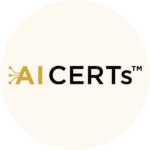
AI CERTS
4 months ago
AI Educator Certification: Redefining the Future of Teaching
Artificial Intelligence (AI) is no longer just a supporting tool in education; it is becoming the backbone of modern teaching strategies. From personalized lesson plans to automated administrative tasks, AI has introduced a paradigm shift in how educators interact with students and manage classrooms. To keep up with this transformation, an AI Educator Certification equips teachers with the skills to integrate AI into their pedagogy effectively.
This article delves into the key components of AI educator certification, its real-world applications, challenges, and the emerging trends shaping education, all while offering actionable steps for professionals seeking to excel in this field.

Why AI Educator Certification is Essential
AI in education has revolutionized teaching and learning experiences. It enables teachers to offer personalized content, manage resources efficiently, and address individual learning needs more effectively. However, these advancements require technical know-how that many educators currently lack.
Closing the Knowledge Gap
Educators without proper training may struggle to implement AI-driven solutions, leading to underutilization of valuable tools. For instance, an adaptive learning platform can analyze a student's learning pace and tailor lessons accordingly, but without understanding how to manage such tools, teachers might fail to harness their full potential. An AI Educator Certification ensures that teachers are well-versed in using these advanced technologies.
Career Opportunities
The demand for AI-skilled educators is rapidly growing. Certified professionals can advance into roles such as instructional designers, AI training consultants, and EdTech specialists. According to a report by MarketsandMarkets, the EdTech market is projected to reach $300 billion by 2027, with AI playing a major role in this growth.
External Resource: Learn about the future of AI in education at EdTech Magazine.
Key Components of AI Educator Certification
AI educator certifications are designed to provide a comprehensive understanding of how AI integrates into education. Let’s explore the detailed components:
1. Understanding the Basics of AI in Education
The foundation of any AI educator certification program lies in understanding the core concepts of AI and its applications in teaching. Participants learn about:
- Machine Learning Algorithms: These enable adaptive systems that tailor lesson plans for individual learners.
- Natural Language Processing (NLP): Tools like chatbots can assist in answering student queries or grading essays.
- Computer Vision: AI systems use image recognition to monitor classroom engagement through facial expressions.
These fundamentals help teachers grasp the technical backbone of AI tools, making them more effective in their application.
2. Practical Training on AI Tools
Certification programs emphasize hands-on experience with EdTech tools, ensuring educators can use them confidently in real-world scenarios. Key tools include:
- Knewton: A platform that offers personalized content recommendations based on student performance.
- Grammarly: Used for improving writing skills and providing instant feedback on essays.
- Classcraft: Gamifies learning, making lessons engaging and interactive for students.
Through this practical training, educators can master the integration of AI into their teaching methods.
3. Ethical and Responsible AI Use
Deploying AI in classrooms requires strict adherence to ethical standards. Certification programs cover:
- Data Privacy: Ensuring compliance with regulations like GDPR and COPPA.
- Bias in Algorithms: Addressing disparities in AI predictions to ensure fair treatment for all students.
- Transparency: Helping educators understand AI decision-making processes to foster trust among students and parents.
For example, a biased grading algorithm could unfairly disadvantage certain student groups. Certifications help educators mitigate such risks by teaching them how to validate and interpret AI outputs.
4. Data Analytics for Educators
Modern classrooms generate vast amounts of data, from attendance records to performance analytics. Certifications teach educators how to:
- Analyze this data to identify patterns and trends.
- Use insights to adjust teaching strategies, such as focusing more on topics where students struggle.
- Ensure data-driven decision-making improves overall classroom performance.
Educators gain a significant advantage by turning raw data into actionable insights.
Real-World Applications of AI in Education
1. Personalized Learning Paths
AI tailors educational content to meet individual student needs.
- Example: Platforms like DreamBox adapt math lessons to a student’s strengths and weaknesses, ensuring they learn at their own pace.
- Impact: Students achieve better outcomes when lessons are aligned with their capabilities.
2. Enhanced Accessibility
AI bridges accessibility gaps, making education more inclusive for all students.
- Example: Speech-to-text tools help students with hearing impairments participate in lessons.
- Impact: These tools ensure equal learning opportunities for students with disabilities.
3. Automating Administrative Tasks
AI reduces the administrative burden on educators, allowing them to focus more on teaching.
- Example: Tools like PowerSchool automate attendance tracking and grading, saving hours of manual work.
- Impact: Teachers can dedicate more time to lesson planning and student interaction.
Related Reading: Learn more about how AI enhances personalized learning in this article by Forbes: How AI is Shaping the Future of Learning and Development.
Emerging Trends in AI for Education
1. Explainable AI (XAI)
Transparency is becoming a critical feature of AI tools, enabling educators to understand how decisions are made.
- Example: Teachers can now see why an AI tool recommends certain content for students, fostering trust in the system.
2. AI-Driven Gamification
Gamified learning tools are revolutionizing classrooms, making lessons engaging through rewards and challenges.
- Example: Classcraft uses AI to create story-based learning experiences.
3. Blockchain Integration with AI
Blockchain enhances the security of student records and ensures transparency in educational certifications.
- Example: AI combined with blockchain ensures tamper-proof educational records.

Steps to Excel with an AI Educator Certification
Achieving success with an AI Educator Certification requires a combination of foundational knowledge, hands-on practice, ethical awareness, and continuous learning. Here’s a detailed roadmap for educators looking to master the integration of AI in their teaching practices:
1. Start with Foundational Knowledge of AI
Before diving into advanced applications, educators need to build a strong understanding of core AI concepts. This includes machine learning (ML), natural language processing (NLP), and neural networks. Understanding these principles allows educators to grasp how AI tools function and how they can be applied in the classroom.
- Focus Areas: Algorithms, data structures, and the basics of AI-driven decision-making processes.
- Resources: Beginner-friendly platforms like Coursera and edX offer AI fundamentals for educators.
- Action Plan: Dedicate time to learning the basics through structured courses and online tutorials.
2. Gain Practical Experience with AI Tools
Theory alone is not sufficient. Educators must develop hands-on skills with the AI tools most commonly used in classrooms.
- Recommended Tools:
- Edmodo: An AI-powered platform for managing classroom activities and assignments.
- Knewton: A personalized learning tool that adapts content to individual student needs.
- Classcraft: A gamified learning platform that uses AI to enhance student engagement.
- Action Plan: Participate in workshops or online labs to practice using these tools in simulated classroom environments. Collaborate with peers to exchange insights on effective use cases.
3. Focus on Ethical Practices in AI Implementation
AI in education must prioritize fairness, transparency, and data privacy. Educators with certifications are expected to act as role models in ethical AI deployment.
- Key Ethical Challenges:
- Protecting sensitive student information.
- Addressing biases in AI algorithms to ensure equitable outcomes.
- Maintaining transparency in AI-generated decisions and recommendations.
- Action Plan: Develop a checklist to evaluate AI tools for ethical compliance before implementing them. Familiarize yourself with regulations like GDPR and COPPA to avoid legal pitfalls.
4. Master Data Analytics for Education
Data analytics is a cornerstone of AI-powered teaching. By analyzing student performance data, educators can tailor their teaching strategies to meet individual needs.
- Focus Areas:
- Learning to preprocess and clean raw data for meaningful analysis.
- Using tools like Tableau and Power BI for visualizing trends in classroom performance.
- Interpreting data to create actionable insights for personalized education plans.
- Action Plan: Start with smaller datasets, such as class attendance or test scores, to practice analysis and gradually scale to larger, more complex datasets.
5. Stay Updated with Emerging Trends in AI for Education
AI in education is an ever-evolving field. To remain effective, educators need to keep pace with the latest tools, strategies, and technologies.
- Emerging Trends to Watch:
- Explainable AI (XAI): Understanding how AI makes decisions.
- Gamified Learning: Increasing student engagement through game-based approaches.
- AI-Blockchain Synergy: Enhancing data security and transparency in certifications and records.
- Action Plan: Subscribe to industry blogs, attend webinars, and participate in EdTech conferences to stay informed about advancements in AI applications for education.
6. Collaborate with Cross-Disciplinary Teams
AI in education often involves working with professionals from diverse fields, such as software developers, data scientists, and curriculum designers. Collaboration ensures the development of well-rounded, effective AI solutions.
- Examples of Collaboration:
- Partnering with data scientists to refine AI models for better learning outcomes.
- Working with curriculum designers to create AI-powered lesson plans.
- Action Plan: Join professional networks and online communities to connect with experts in AI and education.
7. Pursue Advanced Certifications
An initial AI educator certification lays the foundation, but advanced certifications deepen expertise and open up new opportunities.
- Focus Areas for Advanced Certifications:
- AI-driven curriculum development.
- AI ethics and governance in education.
- Advanced data analytics for large-scale educational systems.
- Action Plan: Research globally recognized certification programs and choose one aligned with your long-term career goals.
AICerts Learning and Development Course AI+ L&D™
Why Opt for This Course?
The AI+ L&D certification offers a comprehensive examination of AI's transformative capabilities within educational settings. Through a series of modules encompassing Machine Learning, Natural Language Processing, Ethical considerations, and Emerging Trends, participants acquire a profound comprehension of AI fundamentals and their practical implications. Participants will learn to design adaptive learning systems and navigate ethical dilemmas, fostering responsible implementation of AI solutions.
Skills You Gain:
Upon successful completion of AI+ L&D certification, participants will possess a comprehensive understanding of AI in education, including foundational concepts and practical applications across modules such as Machine Learning Fundamentals, Natural Language Processing for Educational Content, and AI-Driven Content Creation and Curation. They will develop proficiency in designing adaptive learning systems, critically analyzing the ethical implications and biases in AI applications for learning and development, and exploring emerging technologies shaping the future of educational practices.
Contact Information:
For more details, visit the AI CERTs AI+ L&D™ Certification page.
Use the coupon code NEWCOURSE25 to get 25% OFF on AI CERTS’ certifications. Don’t miss out on this limited-time offer!
Why These Steps Matter
Mastering AI tools and principles goes beyond enhancing classroom experiences. It prepares educators to lead the future of education, where AI will play an integral role in fostering personalized, inclusive, and effective learning environments.
By following these steps, educators not only advance their careers but also contribute to shaping a tech-savvy, future-ready generation.